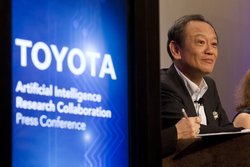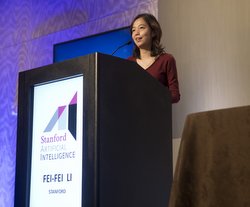$50 Million in Programs at Stanford and MIT
While Silicon Valley seems awash in autonomous Google cars and Carlos Ghosn says Nissan will have an autonomous car on the road by 2020, Toyota is taking a more cautious approach, investing in more research in artificial intelligence and hedging on when any of its self-driving cars might be on the road. At the announcement of the new collaborative ventures at Stanford University in Palo Alto, California, and MIT in Cambridge, Massachusetts, Toyota’s Kiyotak Ise, Toyota Motor Corporation senior managing officer and chief officer of its R&D Group, said the car company has been working on autonomous cars for more than 20 years and expects to add technology that grows out of this research as it becomes available.

“The goal of the research,” Ise said, “is to eliminate traffic casualties and improve the quality of life.” He and Dr. Gill Pratt, who just joined Toyota to lead these projects, emphasized that the research would be looking beyond cars, examining “the autonomy of people” and exploring the mobility opportunities both indoors and outdoors for the aging populations of Japan and the U.S. Not coincidentally, those are Toyota’s two biggest markets.
Dr. Pratt, who was most recently the program manager at DARPA (the Defense Advanced Research Projects Agency) and leader of its Robotics Challenge, added that “the race for the best (autonomous) systems has just begun” and that he envisioned that the end-game of an autonomous vehicle would include “technology that hasn’t been invented yet.” This research is aimed at solving the “hard cases,” Pratt added.

Speaking a few blocks from the home base of the Google cars, Professor Fei-Fei Li, director of the Stanford Artificial Intelligence Laboratory (SAIL), asserted “no one has figured this out yet(designing humans into the system of autonomous vehicles).” Stanford will develop advanced intelligent systems to recognize, understand and act in complex traffic environments, she said. “Building on Stanford’s expertise with computer vision, machine learning, large-scale data analysis and human-computer interaction, our team will work to help intelligent vehicles recognize objects in the road, predict behaviors of things and people, and make safe and smart driving decisions under diverse conditions,” said Professor Li.

At MIT the research will be led by Professor Daniela Rus, who is the director of the Computer Science and Artificial Intelligence Laboratory (CSAIL). She said she hopes through her group’s research to show “computers can make cars better” and work towards a “a car that is never responsible for a collision.” She said the research would take them “beyond safe navigation” into territories where the car and its computers will be able to recognize the state of the driver as well as surroundings (even in inclement weather) and keep car and driver safe.

Ise also said one goal of this research is also to make advanced technologies more affordable, as the company has done with hybrid technology, so they can be used throughout the product line and beyond. One aspect to watch is how this research is integrated into not just Toyota’s vehicles, such as the just-introduced fuel cell Mirai, but projects like its Partner and Human Support Robot. As Pratt said in his introduction, we are “in the middle of a revolution” in mobility.
Related Stories You Might Enjoy:
On the Way to the Self-Driving Car
Elon Musk on the Near Future of the Autonomous Car

0 thoughts on “Toyota Invests in Artificial Intelligence as a Road to Autonomous Cars”